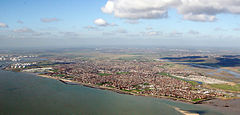
Wilko Johnson, the 65 year old, former rhythm and blues,'Dr Feelgood' guitarist and founding father of the English punk movement has spoken of the strange "euphoria" he has experienced since being diagnosed with terminal cancer and said the news made him feel "vividly alive" and had lifted the bouts of depression he had previously experienced. Last year he was given 9 or 10 months to live and refused chemotherapy when it was clear it might only add another two months to his life.
Wilko is due to play four dates in France followed by three nights in Sheffield and concludes with London, Bilston, Holmfirth and Glasgow in March and has said : "If the cancer kicks in before that, then I can't go on stage. I'm not going to go on stage looking ill - I don't wanna present a sorry spectacle!"
"Every little thing you see, every cold breeze against your face, every brick in the road, you think 'I'm alive, I'm alive' - I hope I can hang onto that. I've had a fantastic life. When I think about the things that have happened to me and the things I've done, I think anybody who asks for more would just be being greedy. I don't wanna be greedy.This position I'm in is so strange, in that I do feel fit and yet I know death is upon me. I'm not hoping for a miracle cure or anything. I just hope it spares me long enough to do these gigs - then I'll be a happy man."
What you possibly didn't know about Wilko, that :
* he was born in Canvey Island, Essex, which may explain his nostalgia for the sight of the River Thames which he shares with Jools Holland :
https://www.youtube.com/watch?v=kpBbjyfCB2o
* went to Westcliff High School for Boy and played in several local groups, before going to the University of Newcastle to study English, including early Anglo-Saxon literature and ancient Icelandic sagas.

* after graduating, travelled overland to India, before returning to Essex to play with the 'Pigboy Charlie Band', which evolved into 'Dr Feelgood' where he developed his own style, coupling choppy playing with novel dress of black suit and unfashionable pudding basin haircut and jerky movements on stage.
https://www.youtube.com/watch?v=GPRP0gdS95A
* played riffs and solos at the same time on a vintage Fender Telecaster without using a pick which allowed him to move around abruptly on stage with the jerky movements of an automaton without the fear of losing the pick..
https://www.youtube.com/watch?v=vEzKXW8q3Dw
* the BBC4 three-part documentary series, 'Punk Britannia' in 2012, stressed the importance of Dr Feelgood as 'pub rockers, a generation of bands sandwiched between 60s hippies and mid-70s punks who will help pave the way towards the short, sharp shock of punk'.
* reviewing his autobiography, 'Looking back at Me', Mark Blake of 'Q Magazine' said of Dr Feelgood : 'In the mid-70s the band's brutish R and B and their guitarists eye-popping thousand-yard stare inspired a young John Lydon, Paul Weller and Suggs from Madness.'
* left the band in 1977. joined the 'Solid Senders', then, in 1980, Ian Dury's band, 'The Blockheads' before forming the 'Wilko Johnson Band' and continued to pursue his musical career in the 1980s and 90s.

* in 2009, appeared in the documentary film 'Oil City Confidential' and was described by :
- reviewer, Philip French as : "a wild man, off stage and on, funny, eloquent and charismatic"
- director, Julien Temple : "an extraordinary man – one of the great English eccentrics."
[
- Peter Bradshaw of the 'Guardian' as : 'the best rockumentary yet, the most likeable thing about this very likable film is the way it promotes Wilko Johnson as a 100-1 shot for the title of Greatest Living Englishman.
'http://www.youtube.com/watch?v=7CZMLs8Ke40

* made his acting debut, cast in the role of mute executioner 'Ilyn Payne', in the HBO fantasy series 'Game of Thrones' after the producers had seen him in 'Oil City Confidential' and said : "They said they wanted somebody really sinister who went around looking daggers at people before killing them. That made it easy. Looking daggers at people is what I do all the time, it's like second nature to me."
 George Reeder is the 63 year old harbour master at Watchet in Somerset became a self effacing old hero at 8.00am on Sunday morning when :
George Reeder is the 63 year old harbour master at Watchet in Somerset became a self effacing old hero at 8.00am on Sunday morning when :







.jpg)

.jpg)

.jpg)


.jpg)





















.jpg)

.jpg)